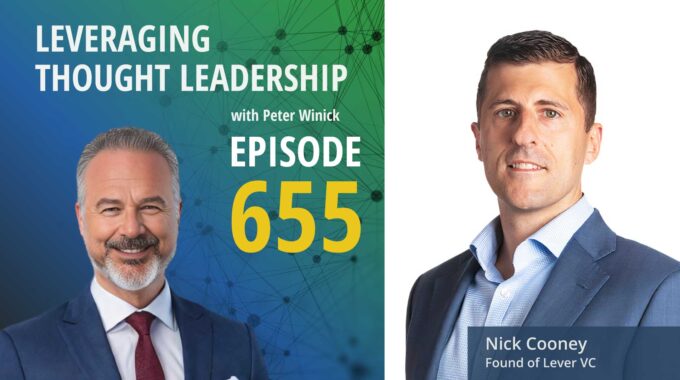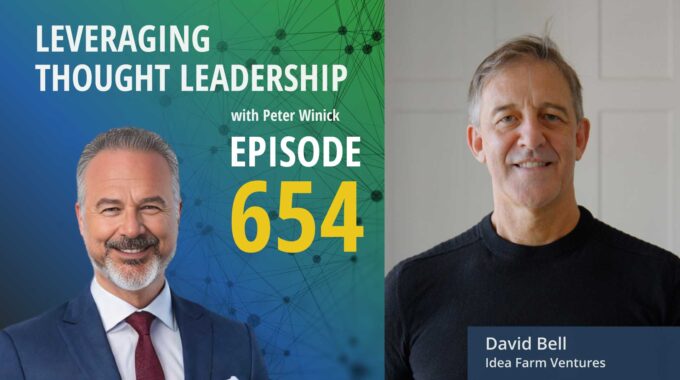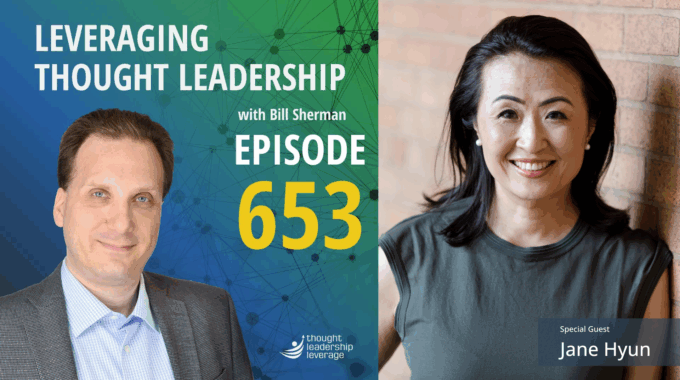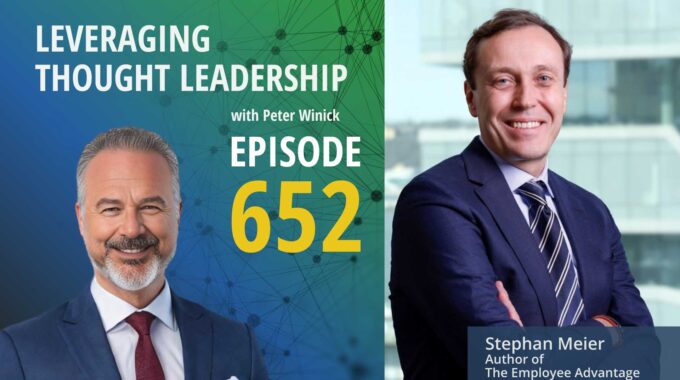How Strategic Content Fuels Growth in Purpose-Led Ventures This episode explores how thought leadership can…
Taking Thought Leadership from Page to Practice | Liz Wiseman
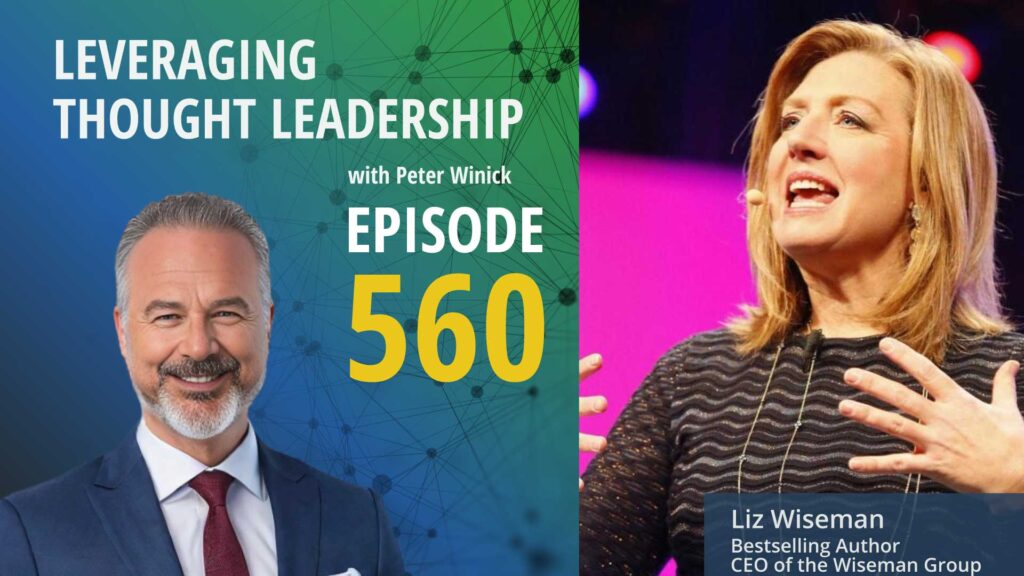
Practical Advice for Thriving in Today’s Leadership Landscape
A conversation with Liz Wiseman about developing the skills needed to teach leadership and write multiple best-selling thought leadership books.
Welcome to the latest episode of Leveraging Thought Leadership featuring our special guest, Liz Wiseman, CEO of the Wiseman Group and renowned author of bestsellers like “Multipliers: How the Best Leaders Make Everyone Smarter“ and “Rookie Smarts: Why Learning Beats Knowing in the New Game of Work.” In this captivating conversation, Liz takes us on a journey into the world of thought leadership, sharing invaluable insights gleaned from her multifaceted career.
With a blend of humility and expertise, Liz reflects on her organic approach to thought leadership, emphasizing the importance of going where you can make a meaningful impact. Drawing from her experiences managing learning functions at Oracle University and later transitioning to teaching and advising top organizations worldwide, Liz offers a unique perspective on leadership development and the complexities of managing and leading.
Throughout the episode, Liz sheds light on the challenges and nuances of being a speaker and thought leader, from the pressure to deliver value despite external factors to the importance of building lasting relationships beyond the keynote stage. She shares practical strategies for creating real change at an organizational level, drawing from her experiences and her commitment to equipping others with the tools they need for success.
In addition to reflecting on her journey as an author and thought leader, Liz offers a sneak peek into her latest research project, exploring the formative experiences in people’s work lives and the lasting impact of first bosses. With her signature blend of insight and authenticity, Liz leaves listeners inspired to embrace their own journey of thought leadership and drive positive change in their organizations and beyond. Don’t miss out on this enlightening conversation!
Three Key Takeaways:
- Organic Career Growth: Liz Wiseman’s journey into thought leadership underscores the importance of embracing opportunities where one can make a meaningful impact, leading to a diverse and rich career path.
- Delivering Value as a Thought Leader: Liz shares insights into the challenges and nuances of being a thought leader and speaker, emphasizing the necessity of consistently delivering value and building lasting relationships beyond the keynote stage.
- Empathy in Thought Leadership: Liz Wiseman highlights the importance of empathy in thought leadership, emphasizing the need to understand and empathize with the motivations and expectations of those who invite speakers. By making meaningful connections with clients and understanding their needs, thought leaders can deliver impactful presentations and foster long-term relationships.
If you need a strategy to bring your thought leadership to market, Thought Leadership Leverage can assist you! Contact us for more information. In addition, we can help you implement marketing, research, and sales. Let us help you so you can devote yourself to what you do best.

Transcript
Peter Winick And welcome, welcome, welcome. This is Peter Winick. I’m the founder and CEO at Thought Leadership Leverage. And you’re joining us on the podcast today, which is Leveraging Thought Leadership. And today, I’m really excited. I’ve got a really special guest, Liz Wiseman. She’s a researcher and executive advisor who teaches leadership to top organizations worldwide. She wrote The New York Times bestsellers Multipliers, The Multiplier Effect, and the Wall Street Journal bestseller Rookie Smart and Impact Player. She’s the CEO of the Weisman Group, a leadership, research and development firm headquartered in Silicon Valley, and she has worked with Apple, AT&T, Disney, Meta, Google. She’s received all the thinkers 50 awards. And basically, in the world of thought, leadership is what we technically call a rock star. So, welcome aboard, Liz, thanks for joining us today.
Liz Wiseman Happy to be here. I have, zero musical talent, so definitely not a rock star, but, exactly.
Peter Winick Exactly. So you’re not announcing the drop of your newest album?
Liz Wiseman No, no. Like, my nightmares are like, I’m on stage with a guitar and I don’t know how to play, so, I’m an anti-rock star.
Peter Winick You’re an anti rock star. There you go. Cool. So why don’t we start with sort of your journey. How did how did this happen. Because what I find fascinating about my conversations with thought leaders is it’s typically not as deliberate or linear or planned as one might think or is obvious in many other professions.
Liz Wiseman Yeah. Mine is probably in the not particularly planned category. I’ve always had a pretty organic approach to my career, which is just kind of go where you can do something useful, and usually there’s something valuable there to do. My career, I guess, in short, is the first half of my career was managing the learning function in a big corporation. I was the head of Oracle University, and so I had a lot of experience managing the training and the learning process. And now in the second half of my career, I’ve really flipped that. And now I’m teaching, managing and leading.
Peter Winick Right. So you went from being on sort of the buy side to the sell side to some degree, right?
Liz Wiseman Yeah. You know, in some ways that’s exactly what I did. I never thought of it that way. But I think it’s one of the reasons why I approach my work the way I do. Not that the teaching part of my work, not the research part of my work, but I know what it is like to bring in outside speakers. I came to work having hired in C.K. Prahalad, and Clay Christiansen and Jim Holland, Rose Beth Kanter, like I had brought them in. And I think I have a tremendous amount of empathy for that act of trust and faith of putting somebody on a stage and giving them a microphone and saying, please speak to all of our most senior leaders in this.
Peter Winick Wait there for a minute, because I think a lot of times thought leaders don’t truly understand because they haven’t come from the other side that you did the amount of risk and to some degree, courage it takes. Right? Because it’s a lot. Right? We’re going to we’re going to gather our top 200 people once a year in Zurich or wherever. Right. So the time is literally the company’s most valuable time. They’ve only got so many hours together. And if you put someone there now, they might be doing a great job relative to how they usually deliver. But if it’s not a cultural fit, if it doesn’t resonate, if there’s a little bit of a faux pas or they’re not aware of kind of what’s going on, it could be a disaster.
Liz Wiseman Oh, absolutely. And, you know, it’s they’re giving you this incredible, valuable real estate this time block. And they’re also giving you a megaphone. And what you say gets amplified. And, you know, I think a lot of speakers would look at it as, you know, if I do a bad job, I’ve kind of I’ve deemed my career, I’ve made a fool of myself. It’s like, oh, no, you’ve made a fool of the person who brought you in. And, you know, I remember this one experience I had in Oracle and, I took a really large Pio to my boss, which was the chief financial officer, and I think it was for $250,000. And it was to bring a particular professor in several times into the organization to teach kind of once a month for us in this program. And my boss, who I had a great relationship with, he turned the color of the shirt you’re wearing. He’s like a little bit more red. He just was blue red in the face, just kind of screaming about what a ridiculous request this was. And nobody was worth that kind of money. And what could he possibly teach our organization? And, you know, he kind of calmed down. I just talked him through it and I thought, yeah, I could see why he would react this way, like on an hourly basis. That’s ridiculous. But so is paying $100 for a pill that’s taken 50 years, right, for the pharmaceutical company to develop, and they’re amortizing their cost. Us, etc. and I remember, like me saying, no, I think we’re going to get incredible value from this. This is why I’m doing it. This is why this is the person we need. And every single person who brings someone into their organization is taking a risk like that.
Peter Winick And things that you said I did, I want to touch on one is, you know, if a speaker doesn’t do great, they’re like, oh, you doing my career? But I think actually as a speaker, you don’t get to have a bad day at work, right? Most of us get to have a bad day at work as a keynote. And we listen. It happens, but you kind of don’t. There’s really almost no excuse unless you have some personal tragedy or something. You can’t go back to the client later.
Liz Wiseman So yeah, that was.
Peter Winick Kind of a you know, I didn’t sleep that great or I had a headache. Like, it doesn’t that doesn’t work at all.
Liz Wiseman You don’t get to no show unless you are like interaction in the hospital. I always tell people I’m like, no, yeah, I’m sick. But the only reason I don’t get to show is that I’m on life support in the hospital. You show up and you don’t get to show up with your sort of big game, and you don’t get to have that day, like, every day has to be amazing. But, you know, and it’s so easy, though, as a speaker to look at it from your perspective. But I think what that first half my career taught me to do is really look at it through the sponsors perspective, the executive. And one of the things I look at, and I would encourage anyone who’s speaking on a stage, if you don’t already do this, I would encourage you to do it. You know, I guess maybe you might have been trained to, like, make eye contact with the and like, look around. I don’t worry about any of that. What I do is I keep my eyes on the people at that front table. Who invited you there. Right. And I want bullet.
Peter Winick Points there so that you I’m taking so many notes here. Two points I want to extract from what you just said there. One is providing value because it is hard to impossible to say, well, you know, I’m a bestselling author, blah, blah, blah. Of course I’m worth, you know, an exorbitant I’m worth $75,000 for a keynote. It’s really, really hard to justify that. So I think you really have to work hard at showing the client where value can happen. And oftentimes, quite frankly, it’s not the keynote because at the end of the day, keynote changes nobody’s behavior and drives no business outcomes. That’s like kind of the dirty little secret in the keynote world. But it’s a great way to bring a level of awareness and engagement and get people to sort of play with those ideas. And then they go, maybe we want more. So that’s the first point. And then the second point that you made is, I love your focus on the front table on the left, because a lot of thought leaders fall into the trap of thinking the folks they have to kill it for is the button, the seat, and the and the reality is there are buyers and there are users, right? So the people that we’re told show up at 2:00 at the Aloha Room because we’re bringing in Liz to speak to you. Listen, we want to make them happy, but if you sign the check, we need to make you happier. And we need to understand what drives you and what motivates you and what success looks like. And I think far too many thought leaders don’t get the difference between those two populations. You want to.
Liz Wiseman And I think are different populations. I wouldn’t necessarily say that you need to make the buyer happier because the buyer is happy if the users got value. And so I don’t want to discount the idea that, like you are, you are there to serve the needs of that organization and that audience. But what I mean is, like I watch the eyes and the faces of the people on that front table to the left, as you called it. I look at when you when I pick a stage, I notice there’s like an excitement in their eyes, but there’s a worry in their eyes. And it’s that first five minutes of what if she says something stupid? What if people don’t play along? What if this falls flat? And it’s a terror. Like I watch tear in people’s eyes, right?
Peter Winick Yeah.
Liz Wiseman And then things like roll and then things are working and people are getting the value. And I watch this complete change of disposition and, you know, facial expression of people like, okay, I made the right decision. Yeah. This validation that like, this is what we’re looking for. And I think at Tommy, empathy for the people who brought you to the table.
Peter Winick If you’re enjoying this episode of Leveraging Thought Leadership, please make sure to subscribe. If you’d like to help spread the word about our podcast, please leave a five star review at rate this podcast.com/l t l and share it with your friends. We’re available on Apple Podcast and on all major listening apps as well as at thought leadership leverage.com, forward slash podcast.
Peter Winick I want to move from keynote. Right. Because a lot of folks kind of I don’t say obsess on the keynote, but stay very much in the keynote space, because if you do that, well, the money’s great. And, you know. You don’t need to have a whole staff and all that. But in in reality, my experience has been that the keynote should be the beginning of a relationship with the client, not the extent of the relationship. If you really want to drive measurable outcomes, if you want them to embrace your ideas, if you want their leaders and managers to practice what it is that you’ve researched and studies, and that doesn’t happen in the form of a keynote, you have to actually think through what is that suite of products and assessment tools, video based learning, etc. what have you done there to sort of drive stickiness in an enterprise and behavior change at the at the org level?
Liz Wiseman Yeah. I’m here to answer your question. Is it okay if I’d like, take you back to my career? So I ran.
Peter Winick We’re doing a flashback now. We need like we’re.
Liz Wiseman Flashing back I the corporate learning function. And I work for a huge global software company. And so part of that was management training and professional development. But a lot of it was product tactical training. And so when Oracle launched a new version of the database or a new suite of tools, it was my job to make sure that every single person in that company was trained on the new product, meaning they knew how to install it, sell it, tune it, you know, support it.
Peter Winick Which probably took priority over people, right? Product probably trumped people in that culture.
Liz Wiseman This was a software company run by Larry Ellison.
Peter Winick Yeah, I that was what I was.
Liz Wiseman Yeah. And so I spent almost two decades like with this mindset, which is when you have a product, you need everyone ready, like equipped with the tools, the training, the support. And so when I released my first book, it like on release date of my first book multipliers, I’m like, okay, well, here’s the keynote, here’s the workshop, here’s the assessment. Right? I wasn’t thinking about it from a business and how to produce income. I had had this trained into me, which is you don’t put something out there into the world without the tools that people need to be successful with it. Like to me it was a.
Peter Winick But it’s the basis of a far more robust business that’s not dependent on is lives in the room or in the zoom today.
Liz Wiseman Oh, absolutely. And it turned out to be like, I think one of the strengths of my work and research and books has not been the books themselves. It’s been the ecosystem, the support system that companies can get training and roll it out, you know, like multipliers. You could get that from Franklin Covey or our partners. You get the lightweight, like we’ve got that whole little universe around it to help people be successful with it, which means it can grow deep roots inside of organizations. But I’m just confessing that this was not business savvy or genius on my part. It’s just the way I had been trained to think, to run a large learning through gave you.
Peter Winick I think that when you came out on the scene as a thought leader, it gave you a competitive advantage, because lots of folks have great ideas in books and they make for a lovely keynote and people can chat about them over the cocktail party. And then, you know, three days later you’re like, how was that? Oh, that was kind of cool. Like, whatever. But when it moves from speaking being maybe the beginning of the journey, you’re going to take an organization or a team or a function unit, functional unit through. It’s really, really different, right? I think it’s just really different when they start to use your language and your models and your methods and your frameworks.
Liz Wiseman Yeah. We we’ve offered a system to organizations that want to deeply implement the ideas. And, you know, it’s always you know, it’s my favorite form of feedback is not like, oh, hey, you spoke at our company, and it was great. Or I read your book, and I loved it. That’s nice to hear. What I love hearing is people saying, wow, you came and like, spoke at our company or we went through your workshop, right? That was like five, six years ago and we are still talking about it and still using those ideas. That’s what that’s what I work for.
Peter Winick Love it. Yeah. And the sustainability of the ideas because otherwise you get, you know, a lot of ideas. Unfortunately, you get the sugar high. Everybody’s into it for a little bit and then you crash and then you move on to the next, you know, donut or whatever the case may be.
Liz Wiseman I know. But Peter, don’t let’s not forget how great a good sugar high is.
Peter Winick Oh, yeah. No, we like them.
Liz Wiseman I’m the daughter of a donut maker. And oh, man, I love a good donut.
Peter Winick Really? Ut Oh! Yeah. That sounds like the album cover that you’re going to do. Daughter of a Donut Maker.
Liz Wiseman Yeah. I hope it doesn’t involve me having to play a guitar.
Peter Winick No, no, no, we know we could probably just do it with ChatGPT or something. Daughter of a Donut Maker. I like that. So, I want to talk a little bit about the publishing landscape. You’ve written four books, five books.
Liz Wiseman Four books, and then one book was the second edition, which was as much work. So, my mind I’ve written five books, but.
Peter Winick I would call it four and a half for technical.
Liz Wiseman Thank you for, yeah. Placating me on the four and a half.
Peter Winick We’ll give you four, 4.8. Whatever. What’s different now about? How do you go about writing a book? And then I want to talk about the, you know, the world that is or the insanity that is the world of publishing.
Liz Wiseman Well, you know, I’d like to think I’m a little smarter about the process and have kind of a big picture. And so, there’s some advantages like I know what it involves. The disadvantage of being a multiple book author is you know how hard it is. And you know, honestly, I kind of am nostalgic. I really kind of yearn for the days when I didn’t know what I was doing, and I just jumped in. And, you know, when I had written multipliers, which I think is like sold over a million copies or something, it’s like it’s kind of up there. I had never written anything longer than an email note, you know, maybe like a three-page report and then, you know, essays in college or what have you, and maybe a Christmas letter every year. But I didn’t know what I was doing, but I signed a contract saying I had an idea right before I needed to write a book. And so I jumped in, like, you know, headlong into this process. And I was the same way with my second book, Rookie Smarts. Like, you know what? Hey, I really enjoyed that book writing process. Like, you know, I told my publisher I like I think I loved every step of this publishing process. Everything except perhaps the index creation, which, you know, they sub out to do that. But I didn’t really love that. But I loved every bit of the research, the writing, the editing. And I said, I think I might have the bug. And she said, oh no, you got the gene. Like you’re sort of back. And so I jumped into my next book, Rookie Smart, and then I’m jumping in and now I’m like, oh, slow down. Like, I now know how hard it is. I know how, right? I know the grind. I know the loneliness, I know the intensity. I know the like roller coaster of emotion that goes into the process. So I’m a little slower to do it because it’s scarier.
Peter Winick And the other side, as difficult and tumultuous as it could be to write the book, let’s talk about the other side, which is, you know, the marketing and the exposure and actually getting the books in the hands of folks that I would argue is the harder part for most.
Liz Wiseman Well, it is, and it’s my least favorite part of it. And I so, you know, I know people who love it. I know people.
Peter Winick Part. Yeah, yeah.
Liz Wiseman Yeah, yeah. And they’re brilliant at this. And I’m one of the people who’s like, okay, it’s a necessary evil. It’s something I need to do. And so I do it. I don’t know that I’m any good at it, but we’ve certainly gotten the word out.
Peter Winick Well, I mean, you’re good at it from the standpoint of the name is out there, the brand is out there. The book sell pretty well, but I think there’s things that you need to do. And by you it could be, you know, a publicist and a team and whatever doesn’t mean you’re standing on the corner handing out books, but that needs to be a part of the process that you put the effort and the energy into. And it might not. Now, some people actually, like you said, it’s interesting. Enjoy that more because there’s the immediate dopamine hit of, oh, watching it go up the charts, or the sales of the book, or the people are buzzing about it. Whatever. Some people, the joy is in really getting the ideas tied and the research and all that. I don’t think one’s better than the other. I think the reality is you need to do a little bit of both. So what? So what’s next? What’s next?
Liz Wiseman What? I’m working on a new research project, a new book, which is probably why you saw me kind of express that reluctance of, like, I’m doing it. So I have started, like, my first round of preliminary interviews, and then I’m going to start doing that. So I’m working on that.
Peter Winick You might be passing a kidney stone. It was one of the two. And I didn’t want to see if you’re passing a kidney stone. So it was one of those two phases.
Liz Wiseman Oh yeah. No, no. I’m sorry. I’m starting a new research and book project.
Peter Winick Cool. Can you give us a tease?
Liz Wiseman Yeah. You know, what I’m looking at is the long term, kind of like most simply put, I’m looking at formative experiences in people’s work life, and particularly the long-term effects of people’s, first bosses and their kinds of experiences that tend to. I don’t want to say much, not because it’s a secret, because I don’t know just yet. But I’m looking at experiences have a deep imprinting effect on people’s mindsets and habits, and.
Peter Winick More on the best boss ever changed my world, or more on Worst Boss ever or we don’t know. Yeah, more on that okay. No, both. Both. Okay. Cool. Because I think that you it could go either way or. But I think we’ve all had both of those experiences. Which one. And they both have impact and influence on how we lead and how we manage in the plot. You have the worst boss ever and say, okay, what I learned from that person is I will never do ABC and day.
Liz Wiseman Yes.
Peter Winick It might have been an easy way to learn it, but cool. Well, this has been a lot of fun. I appreciate your time and your energy, and I’ve been a longtime fan of your work, so this has been a real pleasure for me to spend a little bit of time with you here today. Liz.
Liz Wiseman Well, it’s a pleasure to talk with you. Thanks.
Peter Winick Thanks so much. To learn more about Thought Leadership Leverage, please visit our website at Thought Leadership leverage.com to reach me directly. Feel free to email me at Peter at Thought Leadership Leverage.com, and please subscribe to Leveraging Thought Leadership on iTunes or your favorite podcast app to get your weekly episode automatically.


